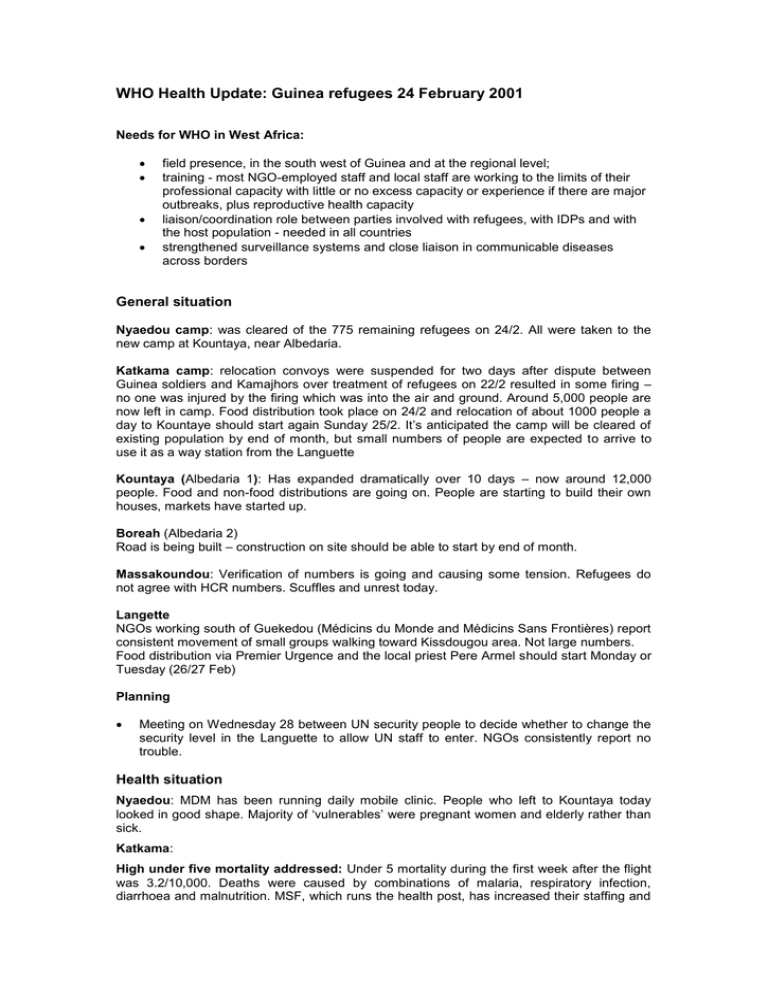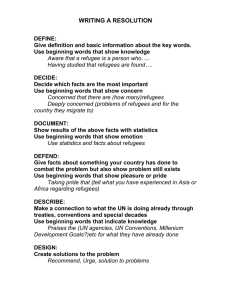WHO Health Update: Guinea refugees 24 February 2001
advertisement

WHO Health Update: Guinea refugees 24 February 2001 Needs for WHO in West Africa: field presence, in the south west of Guinea and at the regional level; training - most NGO-employed staff and local staff are working to the limits of their professional capacity with little or no excess capacity or experience if there are major outbreaks, plus reproductive health capacity liaison/coordination role between parties involved with refugees, with IDPs and with the host population - needed in all countries strengthened surveillance systems and close liaison in communicable diseases across borders General situation Nyaedou camp: was cleared of the 775 remaining refugees on 24/2. All were taken to the new camp at Kountaya, near Albedaria. Katkama camp: relocation convoys were suspended for two days after dispute between Guinea soldiers and Kamajhors over treatment of refugees on 22/2 resulted in some firing – no one was injured by the firing which was into the air and ground. Around 5,000 people are now left in camp. Food distribution took place on 24/2 and relocation of about 1000 people a day to Kountaye should start again Sunday 25/2. It’s anticipated the camp will be cleared of existing population by end of month, but small numbers of people are expected to arrive to use it as a way station from the Languette Kountaya (Albedaria 1): Has expanded dramatically over 10 days – now around 12,000 people. Food and non-food distributions are going on. People are starting to build their own houses, markets have started up. Boreah (Albedaria 2) Road is being built – construction on site should be able to start by end of month. Massakoundou: Verification of numbers is going and causing some tension. Refugees do not agree with HCR numbers. Scuffles and unrest today. Langette NGOs working south of Guekedou (Médicins du Monde and Médicins Sans Frontières) report consistent movement of small groups walking toward Kissdougou area. Not large numbers. Food distribution via Premier Urgence and the local priest Pere Armel should start Monday or Tuesday (26/27 Feb) Planning Meeting on Wednesday 28 between UN security people to decide whether to change the security level in the Languette to allow UN staff to enter. NGOs consistently report no trouble. Health situation Nyaedou: MDM has been running daily mobile clinic. People who left to Kountaya today looked in good shape. Majority of ‘vulnerables’ were pregnant women and elderly rather than sick. Katkama: High under five mortality addressed: Under 5 mortality during the first week after the flight was 3.2/10,000. Deaths were caused by combinations of malaria, respiratory infection, diarrhoea and malnutrition. MSF, which runs the health post, has increased their staffing and opened a second health post under guidance from HCR. ACF started distributing BP5 biscuits for all under 5s. From figures so far this week, situation appears to have improved and mortality should be back under 2/10,000. Kountaya ARC health post Disease Malaria Watery diarrhoea Bloody diarrhoea Bloody diarrhoea with fever Worms ARI Acute lower resp. tract infection Suspected TB Yellow Fever Measles Skin infections STDs Menigitis Cholera Malnutrition Anaemia Eye disease Non-accidental injury Other TOTAL CASES Total Population 5 – 11 February 12-18 February <5 37 24 1 >5 101 8 15 <5 88 49 7 >5 102 20 35 5 20 3 41 3 0 27 41 0 48 12 0 56 52 0 84 0 0 1 11 0 0 0 2 3 0 1 6 0 0 30 25 0 0 1 4 27 9 (8 male) 0 0 0 15 0 0 0 3 0 6 0 2 0 1 23 42 0 0 0 16 19 2 9 124 180 516 32 271 235 735 600-700 12,000 Deaths: Two in 3 weeks. 1/ Pleurisy – death occurred during trip to Kissdougou Hospital 2/ Child – of fever and convulsions early in the morning. Births 14 normal births 12 Feb to 23 Feb, 1 miscarriage (midwife believe as a result of the stress of travelling) 173 pregnant women currently registered, but likely that new arrivals have not come to the antenatal clinic yet. ARC is continuing to support health posts in Kountaya camp and needs to train health workers in reproductive health and laboratory skills were identified. Needs Training: NGOs ask for experts to support training for midwives and traditional birth assistants, family planning, STDs, management of common diseases, epidemiological surveillance for both their own staff and DPS staff. Sample-taking materials for health post plus microscope for parasite analysis – ARC nurse is trained technician Languette: MSF nutritional assessment from far south of area shows global malnutrition rates of 24% under five, but they say it is possible that the figures are skewed by the worst cases coming forward first. Measles Outbreak of 15 cases last week/ 7 deaths in Guendenbou, 20-30km northeast of Guekedou among IDP and host population. UNICEF is working with MDM which has access to the area to start immunization (UN is barred due to security at present). 10 measles cases were reported last week, all bar 1 in over 5s. MSF is planning to restart measles vaccination campaign. UNICEF campaign in Kissidougou town and sou-prefecture will be complete by end of month. They start in Kankan prefecture on March 2, Faranah prefecture on March 8 and in Gueckedou/N’zerekore area if/when security allows. Partner Organisations Some of our partner organisations in the area include: Médecins du Monde (MDM) Health Médecins sand Frontières -Belgium Health/water and sanitation American Refugee Committee (ARC) Health Action contre la Faim (ACF) Nutrition and health GTZ Shelter Hilary Bower 24.2.01 Refugees and IDPs in Gueckedou/Kissidougou area, Guinea N: Nyaedou Kt: Katkama : M: Massakoundou Kya: Kountaya Nf: Niafrando Kya Nf M Kt N

